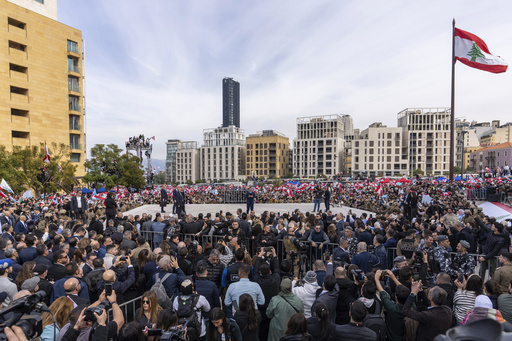BEIRUT — On Friday, a substantial number of supporters gathered in downtown Beirut to commemorate the 20th anniversary of the assassination of former Lebanese Prime Minister Rafik Hariri, coinciding with significant political changes in the region.
The removal of Bashar Assad in December, following 54 years of family governance in Syria, has represented a pivotal moment linked to the long-standing allegations of the Syrian regime’s involvement in Hariri’s assassination and other political deaths in Lebanon.
Additionally, the Lebanese militant group Hezbollah, whose members were found guilty by a U.N.-backed tribunal in connection to Hariri’s murder, now confronts its own critical juncture after the recent killing of its leader, Hassan Nasrallah, in an Israeli airstrike back in September. Nasrallah’s funeral is scheduled for February 23.
“This marks the commencement of justice. If earthly justice has not been served, divine justice is inevitable,” stated Saad Hariri, the former Prime Minister and son of Rafik Hariri, as he addressed the enthusiastic crowd in the capital.
“Twenty years on, Rafik Hariri’s vision continues, and those who attempted to extinguish that vision, look at their current state,” he added.
Nawaf Salam, the newly appointed Prime Minister as of early February, also visited Hariri’s resting place on Friday, remarking on the enduring legacy of the martyr in advocating for Lebanese unity and prosperity.
“Today, we reflect on the remarkable legacy left behind by this great martyr, who worked tirelessly for Lebanon’s unity and well-being,” Salam conveyed through a post on X.
Lebanon’s President Joseph Aoun similarly honored Hariri’s legacy, claiming that Hariri’s national efforts were critical in fostering unity and safeguarding civil peace during his time.
Rafik Hariri was assassinated on February 14, 2005, when a powerful bomb detonated near the historic St. Georges Hotel, resulting in the deaths of 21 others and injuries to over 200 individuals.
In 2020, a tribunal supported by the U.N. sentenced one individual from Hezbollah, Salim Ayyash, to guilty in connection to the assassination, while three others were acquitted. Notably, none of those accused have been apprehended or attended court to hear the rulings.
The assassination catalyzed the “Cedar Revolution,” which mobilized large-scale protests against the nearly 30-year-long Syrian military presence in Lebanon, ultimately leading to the withdrawal of Syrian forces later that same year.
Moreover, it exacerbated sectarian tensions within Lebanon and increased the influence of Hezbollah, an ally of Assad.
Buses filled with supporters arrived early from all corners of Lebanon, converging in downtown Beirut to honor the anniversary, where they waved Lebanese flags alongside the blue flags of Hariri’s Future Movement, resonating with songs praising Hariri.
“After the fall of the Syrian and Iranian influence, we finally have a Lebanese state governing us,” articulated Mohammad Kanaan.
“In this square, we succeeded in pushing out Bashar Assad from Lebanon,” Saad declared emphatically during his address, noting that the Syrian populace heroically revolted against an oppressive regime.
Supporter Ahmad Serhal expressed hopes for unity after Assad’s departure, firing optimism into the crowd: “All recent political changes are beneficial for Lebanon. This nation belongs to all its citizens, and we must work together to achieve unification.”
Ahmad Trab commented on divine retribution against Hariri’s assassins, asserting that the ousting of Assad and the errant systems allied with Iran could usher in a brighter future for Lebanon.
The anniversary also coincides with an imminent deadline for Israeli troops to exit southern Lebanon under a ceasefire agreement, reached at the conclusion of a protracted war with Hezbollah in late November.
Initially deadline on January 26, the pullout date has now been extended to February 18, during which Hezbollah is also obliged to withdraw from areas south of the Litani River, with the Lebanese Army and UN peacekeepers stepping in.
Parliament Speaker Nabih Berri has categorically rejected an Israeli proposition to retain military presence at five critical border positions post-withdrawal.
“It is the responsibility of the Americans to enforce this withdrawal, as failing to do so would set back the government significantly,” he remarked.
President Aoun reiterated the necessity for Israel to adhere to the agreed timeline while Saad strongly urged the withdrawal of Israeli forces in his speech.
On February 8, Lebanon inaugurated a new government under Prime Minister Salam, marking the first fully operational administration since 2022.
Salam, a former International Court of Justice president, formed a diverse 24-member cabinet that includes both technocrats and political representatives from various sects, even those affiliated with Hezbollah.
Although Hezbollah did not officially endorse Salam’s leadership, the party participated in negotiations throughout the government’s formation.
The United States has expressed its backing for the new government, pointing to the importance of stability and essential reforms, even as it opposes Hezbollah’s active participation in the cabinet.
This political transition has reopened avenues for renewed engagement from Arab nations, particularly Saudi Arabia and the UAE, which had distanced themselves from Lebanon due to Iran’s growing influence and Hezbollah’s rise.
These nations are now reassessing their relations, with hopes to reintegrate Lebanon back into the Arab community, echoing the robust connections established during Hariri’s time in leadership.


